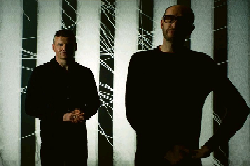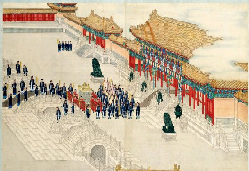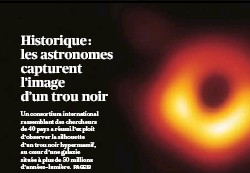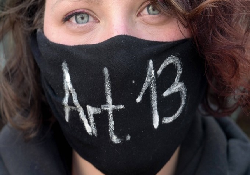April 2019 Culture and Society
Read the articles selected in April 2019
Gloria Origgi “Dans une société où les inégalités augmentent, les passions augmentent aussi”
By Thibaut Sardier
Source: Libération, 13 April
Gloria Origgi’s Passioni sociali collects specialists from different disciplines to explain passions in their collective reach. Relegated into the most private sphere or rationalised by the economical theories, they balance social unjustices and are the driver of the history.
Les émotions, des alliées dans l’art du débat
By Pascale Senk
Source: Le Figaro, 15 April
The seventh edition of the Festival des conversations is dedicated to the conversation in the digital era, to get back in the arene of the social media the elements of a good argumentation and a constructive debate, but also the capacity to use the emotions to fight the adversary.
Chemical Brothers
By Olivier Lamm
Source: Libération, 15 April

The new Chemical Brothers’ work, always on the borders of rock, pop, techno and much more, tells the angst, the sense of lack, and also the hope before the irreversible Brexit. No Geography means “no geography will divide us”.
Strong women
By Sebastian Smee
Source: Washington Post, 15 April

A singular show at the Sackler Gallery in Washington, fruit of an intense diplomatic, scholarly and artistic work, represents through the most disparate objects borrowed from Beijing’s Palace Museum the power carried out by the Qing Dynasty’s empresses in spite of the Confucian rules.
Romain Betrand
By Catherine Calvet e Sonya Faure
Source: Libération, 6 April
The words that describe the nature are important to relate us with it. In spite of living an independent existence, it is the language which gives to it shape and colours, but it is also the evolution of nature and the knowledge, what changes the language and its categories.
“Je t’aimerais plus encore si tu avais une vrai ambition culturelle”
By Pierre Jolivet
Source: L’Obs, 11 April
In occasion of the European elections, an artist writes a love letter to Europe, for how beautiful it could be if careful cultural politicies allowed every European to know its wealthy and variety and to be proud of it.
Au CERN, la cité des sciences imaginée par Renzo Piano
By Laure Lugon Zugravu
Source: Le Temps, 9 April
A city of the science dedicated to the divulgation of scientific research, will open the doors at the CERN. This project, embroidered with a design by Renzo Piano, intends to comunicate the beauty of the science, beyond its usefulness, to make it closer to the great audience.
Historique: les astronomes capturent l’image d’un trou noir
By Tristan Vey
Source: Le Figaro, 11 April

A network of radio telescopes and researchers has made visible what of most mysterious there is: a black hole. Nothing more spectacular than an event followed by six world scientific conferences, since it might not be so simple to conciliate the idea of a real object with the definition of black holes as horizonts of events.
Dans l’atelier florentin de Verrocchio, maître de Léonard
By Éric –Biétry Rivierre
Source: Le Figaro, 16 March
In the five hundredth of Leonardo’s death, Florence celebrates his master Andrea del Verrocchio in his whole greatness, which can’t be reduced neither to his highest pupils of the Florentine Renaissance, nor to his aesthetic intelligence.
Heurex qui, comme Homère…
By Éric –Biétry Rivierre
Source: Le Figaro, 1 April
At the Louvre-Lens, an exhibition of artistic works and casts inspired to the Homer’s world brings together an audience attracted by the Iliad’s and Odyssey’s canto, in a series of images that sink into the lost time of oral poetry.
Akte Weltrettung
By Max Rauner
Source: Die Zeit, 3 April

Client Hearth is an NGO of jurists of the best schools and determined to save the Planet. Before the failure of the scientific and public communication and the weakness of the politics, they use the paragraphs of the law against the industries’ interests.
Read more:
Les maths et nous
By Jacques Attali
Source: L’Express, 3 April
The reforms are not enough to realize better societies, but it is important also what we learn. Mathematics is a method which teaches that a success is never an accident, and enhances the hard work.
Union européeenne. Et si la culture réenchantait l’Europe
By Dominique Nora
Source: L’Obs, 14 March
There has always been an European identity, and it is at the same time an eternal empty to fill. What really matters today are the cultural policies and the normative tools apt to preserving our cultural diversity from the ideological power of the tecnology giants.
Von Europa lernen heisst Demokratie lernen
By Michael Hanfeld
Source: Die Faz, 26 March

The copyright reform, stigmatized as the end of the free World Wide Web, gives back to the European citizenz those juridical principles written in our democratic Constitutions and emptied out in the capitalistic universe of data, where personal contents don’t belong longer to the people, but to groups of companies.
Read more:
A poil à gratter
By Sonia Delesalle-Stolper
Source: Libération, 22 March
A brilliant and feminist Cambridge economist, author of The Sex Factor, a book about the women’s role in the Western economic development, has decided to undress of her not only academic clothes to comunicate what will be the legacy of Brexit for the United Kingdom.
Vincent Van Gogh, a literary life
Source: the Economist, 27 March
An exhibition at the Tate Gallery highlights Vincent Van Gogh’s relationship with the literature, not limited to the writing of his famous letters, but made out from a literary inspiration which impressed the highest moods of his painting, where he transferred verbal images taken from the narrative which he loved most.
Read more:
https://www.economist.com/prospero/2019/03/27/vincent-van-gogh-a-literary-life
Info
- Pubblicato il : 06/05/2019 Modificato il : 06/05/2019
Allegati
- Strong women pdf
- Chemical Brothers pdf
- Les émotions, des alliées dans l'art du débat pdf
- Gloria Origgi pdf
- Les astronomes capturent l'image d'un trou noir pdf
- Au CERN, la cité des sciences pdf
- Je t'amerais plus encore pdf
- Romain Bertrand pdf
- Les maths et nous pdf
- Hereux qui, comme Homère.. pdf
- Dans l'atelier florentin de Verrocchio pdf
- A poil à gratter pdf
- Union Européenne. Et si la culture.. pdf

